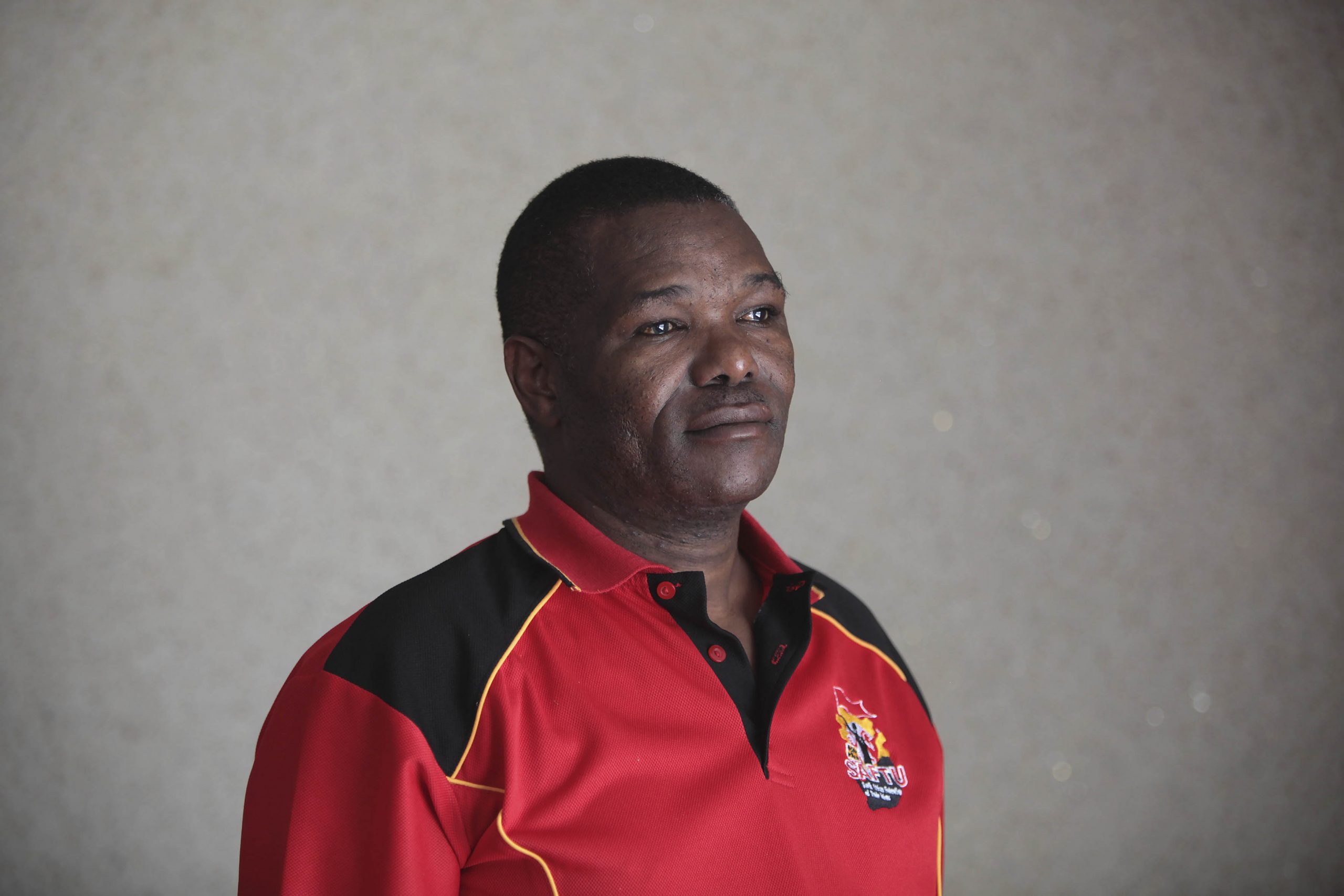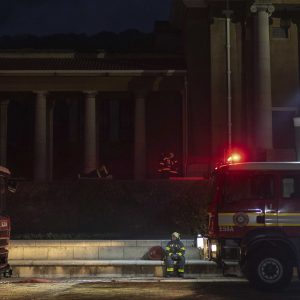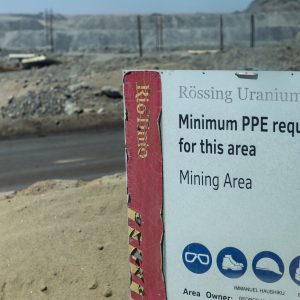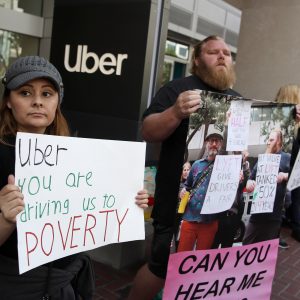Wycliff Mabusela: fighting corruption in unions
The shop steward has faced death threats from corrupt union members and fought bids to privatise water and sanitation across the country, all the while educating workers on their rights.
Author:
30 April 2021

Shop steward Wycliff Mabusela, 53, has won many difficult campaigns, led unions from across Africa on water and sanitation issues and has been threatened with death for his union work over three decades.
After rising up the ranks of elected leaders in the South African Municipal Workers’ Union (Samwu), Mabusela was one of dozens expelled in 2012 by a new leadership that allegedly looted Samwu of R178 million it had built up over 25 years of good financial management. During this time, Mabusela’s life was threatened, but this did not deter him from building a new union, the Municipal and Allied Trade Union of South Africa (Matusa).
Mabusela joined Samwu in the early 1990s as a municipal worker in the accounts department at the now Govan Mbeki municipality in Secunda, Mpumalanga. He was elected as a shop steward and then branch secretary of Samwu by 28, at a time when worker control was the backbone of unions and transparency was the norm. As a result, there were layers of honest and committed union leaders from workplace level right up through to the branch, provincial and national levels of the union. Decisions were not made without the mandate of grassroots members, he says.
Against privatising municipal services
Mabusela immediately became involved in the union’s anti-privatisation campaign. South Africa was only one year into the democratic dispensation, and Samwu was shocked when it heard the new ANC government wanted to privatise municipal services – a sharp contradiction to the 1994 election promises of services for all.
The apartheid government privatised Secunda’s sewage plant in Embalenhle in 1981. “We demanded it back. We involved the communities and local media. The pictures of the dilapidated plant confirmed that these private companies take services while they are in a good state, and then run them down. They fix things with very cheap materials that won’t last. There were many sewage spillages during that time. The pumps were no longer even working,” says Mabusela.
Mabusela learned everything he knew about water and sewage from the workers. “I had never worked in a sewage plant. I didn’t even know what sludge was or how they purify the water,” he says. After having the Embalenhle sewage plant de-privatised in 1997, “we took that knowledge to use in our national campaigns against privatisation of water and sewage plants”.
Related article:
Solidarity flooded in from British and French trade unions, who had seen the effect of multinational water companies that were handed contracts and then increased water prices while allowing water quality to decline. By 1997, the same companies were vying to privatise services in South Africa.
Mabusela was elected as the co-chairperson of the Public Services International (PSI) Africa sub-committee on water and sanitation. PSI is the international federation of all public-sector unions globally. The campaign benefited from research into British and French multinational companies carried out by the University of Greenwich in the United Kingdom, which was part of PSI’s research unit.
“British Biwater wanted to privatise the water of Nelspruit. We received information from the research unit that Biwater was a failure in England but they wanted to come to South Africa. We invited our [member of the executive council] for local government to discuss this but he said he had received an instruction from [then president] Thabo Mbeki that the Nelspruit water privatisation was the flagship project and must not fail,” says Mabusela.
The privatisation eventually happened. By 2004, the water was infected with E. coli, the water treatment plant had broken down and eight children had died, allegedly as a result of the unclean water, says Mabusela. Working class communities in Nelspruit rose up, refusing to pay water bills and torching councillors’ properties. Mbeki had intended the Nelspruit privatisation project to be an entry point for water multinationals to privatise across the country but because of the scandal and community resistance, the plan never took off. “But it was very sad for those who lost their lives due to that privatisation,” Mabusela says.

The union was also fighting the ANC’s iGoli 2000 plan to privatise every municipal service in Johannesburg. “The union had so many campaigns. We were running around all over the country campaigning. Here in Secunda, we had a new campaign against pre-paid water and electricity. Our argument was very simple – we wanted quality and affordable services, but with pre-paid if you don’t have money you automatically have cut yourself off,” he says.
A consummate organiser, Mabusela believes campaigns must involve organisations with structures and a mass base who can be drawn in. “We had pamphlets about privatisation in different languages. Whether it was [the South African National Civic Organisation] or a church [or a] taxi association meeting, political party meeting or whatever structure existed, we would deploy people there to talk against privatisation. The most important thing we believed is the community must understand what your fight is about. Win them over, and they will obviously join you and fight together with you,” he says.
Related article:
By 2005, with Samwu 18 years old, the union had taken part in drafting postapartheid South Africa’s new Labour Relations Act, Basic Conditions of Employment Act and Employment Equity Act. The union had won enormous benefits for members and became stronger through a three-week national wage strike in 2002, during which a striking worker was knocked down and killed and other workers were badly assaulted by police and imprisoned overnight, some with broken collar bones.
“In 2005, we had organisational renewal, taking stock. Our resolutions continued to focus on all angles of service delivery, and what we mean by quality and affordable services,” says Mabusela, who by this time had also been elected to sit on the board of the local government sector education and training authority, which designs programmes to upskill municipal workers.
“Our work was the opposite of what government is doing now with the Expanded Public Works Programme where people are employed for a short time and the government counts that as job creation. Yet they give those workers only enough to pay for transport. They cannot buy proper food or pay school fees. It is a stipend but government counts it as employment,” he says.
The municipal union falls
Things took a turn for the worse in 2009. Samwu had always operated on a strict budget with financial statements available to all members to ensure money was not being wasted. As a result, it owned several offices and had built up almost R178 million in reserves.
“First, the corrupt elements mobilised to vote out our founding president, Petrus Mashishi,” he says. The Samwu head office was then shut down and the finance department officials who had managed the union funds since it launched in 1987 were retrenched.
Related article:
By 2012, the entire union leadership had been replaced. Many of the union’s offices were later sold and expensive lease agreements were taken out with different service providers, with kickbacks rumoured to have been paid to the new national leaders. “We opened a case of corruption against the new national office bearers – they transferred R136 million from the reserves to the operating account and from that operating account there were many other transfers that took place,” Mabusela says.
The Hawks are still investigating the matter. The group that blew the whistle was expelled. They argued against their expulsions in the Johannesburg high court and four drove straight to Durban where Samwu’s central executive committee meeting was about to sit.
“The national leaders called hotel security, then [the] metro police, then SAPS to remove us. They all declined. The national leaders then vanished and came back two days later with an interdict preventing us from taking part in the meeting. But it didn’t prevent us from sitting outside the hall where we could hear all the discussions,” Mabusela says.
Related article:
But that night, one of the expelled leaders was beaten up and Mabusela and others received death threats. “We hid in the rooms of sympathetic comrades. When we looked out the window, the hotel was surrounded by the new people sitting in their cars. We could not leave. Eventually at 4am … we hid in a car, leaving our own car behind. They chased us. But luckily we had a great driver!”
The expelled group then started the Save our Samwu (SOS) campaign. “We ran the SOS campaign for about a year, issuing pamphlets and newsletters, trying to inform members of the corruption and then we realised it was not going anywhere so we launched new unions,” Mabusela says.
These were Matusa and the Democratic and Municipal Workers Union of South Africa (Demawusa), both now affiliated with the South African Federation of Trade Unions (Saftu) and contemplating a merger.
Political education
It has not been easy to get the new unions off the ground because municipalities deny the new unions organisational rights and the right to take part in collective bargaining. Despite this, Mabusela succeeded in getting organisational rights for Matusa in the Govan Mbeki municipality.
Mabusela says the unions have changed a great deal over the years. In Samwu, which is still a majority union in most municipalities, “there is no longer worker control. It is run by officials. It mirrors the corruption we see in municipalities. For example, councillors are the ones who are shortlisting people for new jobs. They are even sitting on interview panels for labourer positions – where have you ever seen that?”
He recommends that unions return to the days of holding mass-education programmes. “We used to educate members that there is a struggle beyond the workplace. Our struggle is about the working class and the poor. For the new generation it is only about money and status so we need to address that through advanced political education. At the moment people only think of what’s in it for them. If we can get rid of that, then unions can be back on track.
“We do have a lot of comrades who crossed the floor. The liberators of today become the worst oppressors of tomorrow and this is really true. Money is very dangerous and people get co-opted,” he says, adding that politicians have even come to his house when he was not there and told his wife the reason they are impoverished is because Mabusela will not “cooperate” with them.
Related article:
Mabusela comes from the era where shop stewards underwent advanced union training in employment law, negotiating and how to win disciplinaries, so much of his time is now taken up offering free labour relations advice to any worker in any industry.
He is enthused by the power of smartphones and social media to improve organising. “I have set up so many WhatsApp groups – one where workers discuss different issues, another one for Matusa members here and another for a group of security guards I was helping to unionise for another Saftu union.”
The hard-working Mabusela is optimistic about the future. “Union members don’t understand the power that they have in their hands if they are united. Workers can still change this around by taking over their unions. They cannot be spectators in their own organisation. They must get involved, demand scheduled meetings. Currently in some unions, the elected leaders will hold ad hoc meetings whenever it suits them only to manipulate workers into fighting for something that will benefit leaders, not the workers”.
Editor’s note: Majavu worked at Samwu and took part in the anti-privatisation campaign.





